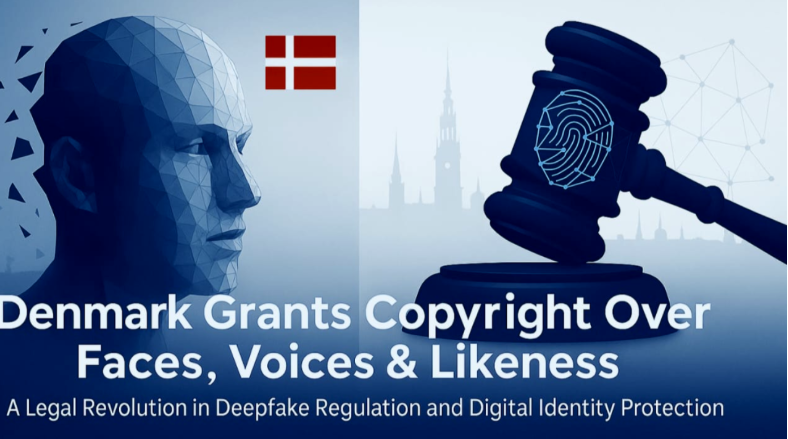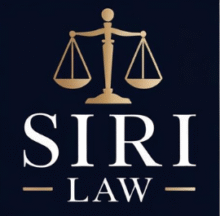
In a bold and unprecedented legislative move, Denmark is set to become the first country in the world to grant its citizens copyright over their own faces, voices, and likenesses. Amid the rapid rise of deepfakes and generative AI technologies, the Danish Ministry of Culture’s amendment to its copyright law signals a turning point in the global dialogue on digital identity, privacy, and technological ethics.
This article offers an in-depth analysis of the legal architecture and implications of the reform, its compatibility with international frameworks, and its relevance for India and other jurisdictions currently grappling with the legal vacuum surrounding synthetic media.
I. Deepfakes and the Erosion of Personal Autonomy
Artificial intelligence has enabled the manipulation of images, videos, and audio with alarming accuracy. In a matter of seconds, a person’s face or voice can be cloned and placed in fabricated settings-political speeches, defamatory videos, or illicit content-without consent. This is not merely a technological dilemma; it is a constitutional and legal crisis concerning identity, consent, and accountability.
Deepfakes now pose real-world consequences:
- Defamation and harassment of private individuals and public figures.
- Reputational harm and misinformation in political campaigns.
- Fraudulent impersonation in financial and legal transactions.
- Undermining of democratic trust through the circulation of fake news.
Current legal frameworks-especially those based on traditional copyright, defamation, or data protection-lack the clarity and scope to address the speed, scale, and specificity of this threat.
II. Denmark’s Legislative Proposal: A Structural Innovation
On June 26, 2025, Denmark’s Ministry of Culture introduced a legislative proposal that would modify the nation’s copyright law to treat an individual’s likeness-face, voice, and personal features-as a copyrighted asset, thereby providing legal standing to citizens whose biometric identities have been cloned without permission.
Key Elements of the Proposal:
- Individual Copyright Over Personal Traits: Every person in Denmark will hold enforceable rights over their face and voice, which cannot be used or cloned without express consent.
- Civil Legal Remedies: Citizens will have the right to file claims against individuals or entities that use AI-generated representations of their face, voice, or likeness. This includes content shared via media, advertisements, or digital platforms.
- Extension to Performing Artists: The law reinforces protection for actors, musicians, and speakers whose performances may be digitally replicated using AI tools, securing their economic and moral rights.
- Platform Accountability Under EU’s Digital Services Act: The proposal works in synergy with existing European digital regulations. Platforms must promptly remove unauthorized deepfake content upon notice, or face significant legal and financial penalties.
- Safeguards for Satire and Parody: Exceptions are carved out for lawful expression under freedom of speech principles, including political satire and artistic parody, provided they do not involve defamation or impersonation.
III. Comparative Jurisprudence and Policy Influence
Denmark’s reform offers a template for identity-as-property rights, blending privacy, copyright, and civil law doctrines. Other jurisdictions are observing this development closely.
United States:
- Current proposals like the No AI FRAUD Act and Take It Down Act reflect a growing trend toward legislative protection of biometric identity.
- Several states, including California and Illinois, already have biometric privacy laws (e.g., BIPA), though these remain limited in scope compared to Denmark’s all-encompassing copyright model.
South Korea:
- Enacted strict criminal penalties for the creation and dissemination of sexually explicit deepfakes, especially targeting minors and celebrities.
United Kingdom:
- The Online Safety Act includes provisions on removing harmful AI-generated content, but it does not provide personal copyright protection over identity traits.
Denmark’s model is distinctive in that it does not require proof of financial harm or criminal intent-it allows private enforcement based on unauthorized usage alone, making it proactive rather than reactive.
IV. Legal Challenges and Doctrinal Innovations
Denmark’s move raises critical doctrinal questions for courts and lawmakers worldwide:
- Can Personality Be Copyrighted? Traditionally, copyright protects original expressions—not identity. This reform disrupts that boundary by recognizing biometric expression as a form of intangible property.
- Overlap with Privacy and Data Laws: It introduces a hybrid legal regime, where a person’s likeness becomes both a privacy interest and a proprietary asset-demanding careful legislative harmonization.
- Enforcement and Jurisdictional Limits: In an internet-governed world, unauthorized deepfake creation often originates from jurisdictions outside the victim’s country. Denmark’s proposal anticipates this by reinforcing platform obligations, but cross-border enforcement remains a key legal challenge.
V. Relevance to Indian Legal Context
India currently lacks dedicated legislation addressing deepfakes or the unauthorized use of biometric identity in AI-generated media. Although some protections exist under:
- The Information Technology Act, 2000 (Sections 66E, 67A, etc.)
- Indian Penal Code (Sections on defamation, impersonation, obscenity)
- The Right to Privacy (Puttaswamy v. Union of India, 2017)
…none offer explicit redress against synthetic content or deepfake harm.
Denmark’s model could guide Indian reform in areas such as:
- Statutory recognition of biometric identity as a personal asset.
- Civil enforcement mechanisms for wrongful AI-generated content.
- Obligations for Indian and foreign tech platforms to implement prompt removal policies.
- Integration with the proposed Digital India Act and Data Protection legislation.
The Indian legal ecosystem must act decisively before the misuse of deepfakes outpaces judicial remedies.
VI. Conclusion: Toward a Digital Self-Ownership Framework
Denmark’s deepfake law is not merely about technology-it is a landmark declaration of individual sovereignty in the digital age. By legally recognizing that our identity is an extension of our personhood, and that consent is non-negotiable, the law sets a new benchmark for democratic regulation of emerging technologies.
For countries like India, where both the pace of technological adoption and the potential for misuse are immense, Denmark’s legislation offers a roadmap-one that balances innovation with ethics, and creativity with dignity.
About SIRI Law LLP
SIRI Law LLP is a modern, multi-sectoral law firm committed to providing strategic legal solutions at the intersection of technology, media, regulation, and rights. Our dedicated teams advise clients in AI governance, intellectual property protection, digital privacy compliance, online platform accountability, and entertainment law. We serve sectors including technology, OTT media, software development, data analytics, advertising, cybercrime prevention, and education, offering a blend of litigation support and advisory services.
With a growing demand for clarity on issues such as identity misuse, unauthorized digital replication, and biometric consent, SIRI Law LLP is at the forefront of legal innovation. We help clients draft ethical AI policies, respond to reputational threats, file takedown requests, and pursue cross-jurisdictional legal action when digital rights are violated.
We believe that in the age of synthetic reality, legal frameworks must preserve the integrity of the real self.
For more information, visit www.sirilawllp.com or connect with us on LinkedIn.

